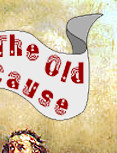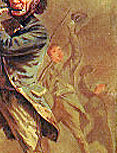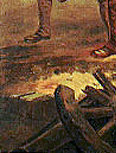EARLIER
PHASES OF DEMONIZATION
Still,
the liberals and lefties did get a crusade which justified
an endless heaping-up of post-constitutional jurisdictions
and power in Washington, very useful for totally reconstructing
American society both during and after the Great Emergency.
They weren’t entirely unhappy.
In
that reasonably happy era, the Official Media presented
the political spectrum as a set of structuralist "binary
oppositions" with some terms so "unmarked"
as to be missing. If only Levy-Strauss had been around
to help. First, came the Liberals, kindly sorts who
wanted to do good: Mass Transit, Federal Highways,
Federal Aid to Education (but no federal control,
of course), etc. Abroad, they wished to build democracy,
contain communism, and give every downtrodden foreigner
a school lunch. Their "cause [was] mankind,"
as Senator Hubert Humphrey, a typical spokesman, put
it. Then came the Moderates, less high-minded but
still salonfaehig. Their kindness wasn’t cosmic,
but did earn them praise in the press, especially
insofar as they kept the Republican Party from "isolationist"
sin.
Moving
rightward, we skip the absent category of Conservatives
and go straight to Ultra-Conservatives, followed closely
by Radical Rightists and other extremists. Officially,
there could be respectable Conservatives, but
Liberals seldom handed out the unadorned C-word, having
given the only available ones to Clinton Rossiter,
Herbert Agar, Walter Lippman(!), and Peter Viereck.
These "Conservatives" served to distract
attention from the absence, otherwise, of the whole
category. Liberals already saw most rightists as extremists
and incipient storm troopers, who were just hiding
their armbands and giving their funny salutes indoors.
For years, Benjamin Epstein and Arnold Forster kept
writing the same book, which lumped everyone to the
right of Nelson Rockefeller in with the KKK and the
handful of genuine anti-Semites who could be scraped
up at the time.
WHATEVER
HAPPENED TO ‘DUPES’?
Epstein
and Forster didn’t set the tone, however. One could
still be a "dupe." Liberals and lefties
made fewer claims then for their telepathic skills
and didn’t always see straight into their opponents’
hearts to the (expected) fascist/Nazi core. They did
a lot of mind-reading on Barry Goldwater in 1964,
but that was a genuine emergency for them. Generally,
they could let rank-and-file rightists off as dupes
– red-necked victims of the airborne propaganda
of H.L. Hunt, the Reverend Carl MacIntire, and Dan
Smoot. Ultras were the sort of folk, then, who only
complained about things because they were undereducated,
status-anxious lower middles, easily led around by
right-wing dog-food millionaires who were "using"
them to prevent repeal of the Dog Food Depletion Allowance
or something like that. Give any one of them a bureaucratic
berth or membership in an AFL-CIO union, and he (or
she!) would soon settle down to greet the radiant
future with full social-democratic enthusiasm.
THE
HIGHER DEMONIZATION
So
much for the mainstream media’s socially constructed
political spectrum. There was, however, a higher academic
take on right-wing dissent. The heavy lifting here
was done by sociologist Seymour Martin Lipset, the
immigrant Marxist party animal Theodore Adorno, end-of-ideology
sociologist Daniel Bell, the tame "conservative"
Peter Viereck, and historian Richard Hoftstadter,
whose treatment of Charles Beard I noted in a previous
column.
Hofstadter
called Birchers and Goldwaterites "pseudo-conservatives,"
by which he meant that good Conservatives were okay,
if there were any. A good Conservative was someone
like Viereck, so decent that he wanted to conserve
the New Deal while fighting Joe McCarthy and those
overseas communists, too. A decent Conservative, in
short, supported big government, Cold War liberalism,
and the American empire, and made marginal criticisms
about greater efficiency and focus. The pseudos, alternately
"isolationist" and warlike, were a standing
danger.
History’s
famous irreversible clock foretold that fossilized
laissez faire liberals were doomed to go astray. They
were liberal in 1832, but now these ignorant farmers
and petty-bourgeois were up the sociological creek
sans paddle; they failed to see that Modernization
made "bigness" in government, business,
and labor inevitable. They overlooked the many social
benefits which accrue when trade unionists beat up
"strike-breakers" and blindly refused to
sign up for interest-group politics overseen by steadily
growing government – the only form of politics
now possible.
Going
astray, the pseudos and ultras would be drawn towards
fascism. Casting aside the "impossible"
restoration of laissez faire and limited government,
they would settle for big government which catered
to their interests. In some ways, this is the
actual story of the right-wing Establishment’s long
march from its Buckleyite beginnings around 1955 to
its "successes" in giving us Reagan, Bush,
and Newt, all keen enough on conserving the New Deal,
waging the Cold War, and extending the empire. They,
indeed, could be called "pseudo-conservatives,"
because there was nothing very conservative, much
less libertarian in their program. Theirs was precisely
the "decent conservatism" demanded by Cold
War liberals in the 1960s.
They
got little credit for all this realism and decency
and were attacked for "dismantling" big
government and for bringing back laissez faire. And
yet big government seems healthy enough, the empire
grows, and laissez faire seems rather absent. Some
of this response was purely partisan, as Walter Karp
would say, with the "outs" attacking the
"ins" for allegedly implementing their program,
which program the "ins" had tossed into
the first handy garbage can on coming to power. More
importantly, the chattering classes and the press
had moved leftward since the sixties and the "decent"
conservative position of 1963 now seemed the darkest
Reaction. Poor Newt was said to be bent upon mass
starvation – right there in the streets – of
widows, old folks, and ethnic minorities, when even
that would have been more of a plan than he actually
had. The lesson may be that whatever the success of
televangelists, politicized Christians, empty Republican
suits, etc., the political spectrum always moves
to the left, as defined by the permanent bureaucracies
and their academic/media allies. (We can’t ignore
the possibility that there may be "decent leftists"
out there who object to some of that program.)
WHERE
DOES THAT LEAVE ‘FASCISM’?
If
Hoftstadter’s good conservatives now share power on
the basis of a watered-down program of vacuous, museum-quality
Rockefeller Republicanism, are the results any more
– or less – "fascist" than when
kindly Liberals and jovial Moderates had centralized
power mostly to themselves? Apparently not. And the
Non-Respectable Right – are they the real fascists,
to be included in any search for the real killers?
For the most part, no.
‘FASCIST’
ASPECTS OF MODERN LIBERALISM
This
brings us to the Old Right critique of the New Deal.
This could be rejected as a pre-emptive strike by
the real fascists to shift the blame onto their enemies.
But John T. Flynn, Congressman Samuel Pettengill,
and John Chamberlain took up this thread before
the Old Right was fully formed, at a time when well-meaning
Liberals were writing about all the interesting things
Mussolini was doing. Some Liberals found in fascism
a pragmatic approach which, if divorced from the one-party
state and its noisy, militaristic style, could occupy
the middle ground between "run-away capitalism"
and Soviet communism. After all, society had to
be rationally reconstructed, some way, didn’t
it?
As
Mussolini's reputation fell, comparison of New Deal
and fascist corporatism became the concern of a few
"extremists." More recently, historians
have taken a second look at the actual structural
parallels in these corporatist experiments.1
While it is now generally agreed that corporatism
survived the demise of fascism, it can also be asked
whether fascism survived its supposed death.
In
1954, Hofstadter chided those who had worried about
"several close parallels" between FDR’s
N.R.A. and fascist corporatism. There are more than
"several" parallels. In 1944, John T. Flynn
made the case in As We Go Marching, where he
enumerated the stigmata of generic fascism, surveyed
the interwar policies of Fascist Italy and Nazi Germany,
and pointed to uncomfortably similar American policies.2
For Flynn, the hallmarks of fascism were: 1) unrestrained
government; 2) an absolute leader responsible to a
single party; 3) a planned economy with nominal private
ownership of the means of production; 4) bureaucracy
and administrative "law"; 5) state control
of the financial sector; 6) permanent economic manipulation
via deficit spending; 7) militarism, and 8) imperialism
(pp. 161-62). He proceeded to show that all these
were alive and well under the wartime New Deal administration
(pp. 166-258). Pragmatic American liberalism had produced
"a genteel fascism" without the ethnic persecutions
and full-scale executive dictatorship seen overseas.
Flynn found this insufficiently cheering. Some may
call Flynn’s catalogue of fascist traits arbitrary.
Perhaps, but Flynn listed things he found; he did
not make them up.
Fascism
was an ideological garage sale combining integral
nationalism, militarism, imperialism, corporatism,
the leader principle, populism, racialism, anti-Semitism,
a doctrine of the enemy, a love/hate relationship
with modernity, national regeneration, Vitalism/pragmatism/will-to-power,
anti-Marxism, anti-egalitarianism, etc. – most of
which had served some time on the Left. Integral nationalism
could be seen already in the French Revolution. Political
anti-Semitism was pioneered by the 19th-century
Left (Jews and capitalists being somewhat interchangeable
for them) and was only taken up later by right-wing
nationalists, who used it against liberalism. It was
largely absent from Italian fascism. Marx and Engels
had their racial views, which were very politically
incorrect, as Nathaniel Weyl has shown in a very neglected
book.3 It was socialists
who wrote of killing millions of their enemies
on the basis of class and racial identity.4
When later socialists became politicians and bureaucrats,
they tended to disown such views – leaving aside
that peculiar Sonderweg – or separate path
– followed in Russia.
WERE
THE ‘RADICAL RIGHTISTS’, WELL, RIGHT?
As
heirs of classical liberalism the Old Right saw all
state interference in the economy as "collectivism."
In seeking analogues for the New Deal, those who made
the comparison with fascist corporatism showed superior
perception. This analogy persisted on the Radical
Right.
In
1968 the Radical Right writer Kent Steffgen produced
a polemic against then California Governor Ronald
Reagan, Here’s the Rest of Him. His overall
conclusion: "America is offered the choice between
government of limited powers and the corporate state.
One is a nation, the other an empire." He saw
Reagan as a Rockefeller Republican, who was on the
wrong side of that choice. Reagan no more "dismantled"
big government in California than he later did at
the federal level. If you folks had read Steffgen
in 1968, you could have avoided some disappointment.
THE
SOCIAL-IMPERIALIST/
SOCIAL-NATIONALIST PIVOT
The
most economical explanation of fascism is this: In
the late 19th century, right- and left-wing
enemies of laissez faire liberalism converged on a
program of social imperialism and social nationalism.
Leftists who concluded that socialism could only be
realized within existing nation-states and rightists
who rejected laissez faire capitalism in favor of
social programs for their co-nationals increasingly
saw eye to eye. They called for "national socialism"
or "national syndicalism."
The
catastrophe of World War I only intensified these
strivings. Then, the International Socialists put
their oar in, in Russia and in the short-lived Soviet
republics in Bavaria, Hungary, and elsewhere. Everywhere,
the Left talked bloody, total destruction of existing
society, producing the reaction which brought fascists
to power. Heirs to many of the same destructive ideas
(with a few original ones), national socialists posed,
for a time, as the only alternative to murderous communism.
World War II helped obscure the actual similarities
between all these regimes. Poorly focused Cold War
polemics about "totalitarianism" further
obscured them.
FASCISM
A HERESY OF THE LEFT?
Was
fascism right or left? Is the almost comic-opera episode
in Italy really to be equated, aside from the accidents
of war, with the thorough-going criminality of the
National Socialist regime in Germany? Or should the
latter be classified with the "national communism"
(in practice) of Stalin? As the political scientists
say, more research is necessary.
The
Old Right and its successors sensed that these regimes
had much in common. I remember a classic issue of
Human Events in 1963 or 1964 with Mussolini,
Hitler, and Stalin on the cover, characterized as
three socialist dictators. At a higher level of sophistication,
historian Hugh Thomas and political scientist A. James
Gregor have described fascism as "a heresy of
the Left.5
HAVE
WE SOLVED THIS PROBLEM?
There
is an enormous literature on fascism. I have slogged
through a lot of it – with a growing feeling
that, here, more literature may be the enemy of clarity.
I propose, for now, a simple practical procedure.
1) The next time Uncle or a Certified Ally denounces
domestic or foreign opponents as "fascists,"
check whether those opponents have funny salutes,
torch-light parades, armbands, a program combining
bad ideas from Right and Left, and so on. 2) Now look
at the government making the accusation. Does it display
more than half of the traits on John T. Flynn’s or
any other reasonable list of fascist traits? Hmmm.
If
the government in question seems about as "fascist"
as the proposed enemy du jour, do not, I repeat do
not sign up for some sort of Exceptional Intervention.
For that matter, don’t sign up ever. There is no opposition
anywhere that can’t be represented as fascist. There
probably are real fascists out there. I don’t think
it’s our problem unless they show up with armies on
our shores. Anyone who looks into it will find, I
expect, that the makers of our elusive foreign policies
have – over the long haul – backed more fascists than
they have opposed. Situational antifascism is the
tactic of the day. It may be even more of a snare
and a delusion than Cold War anti-communism was.
Notes









